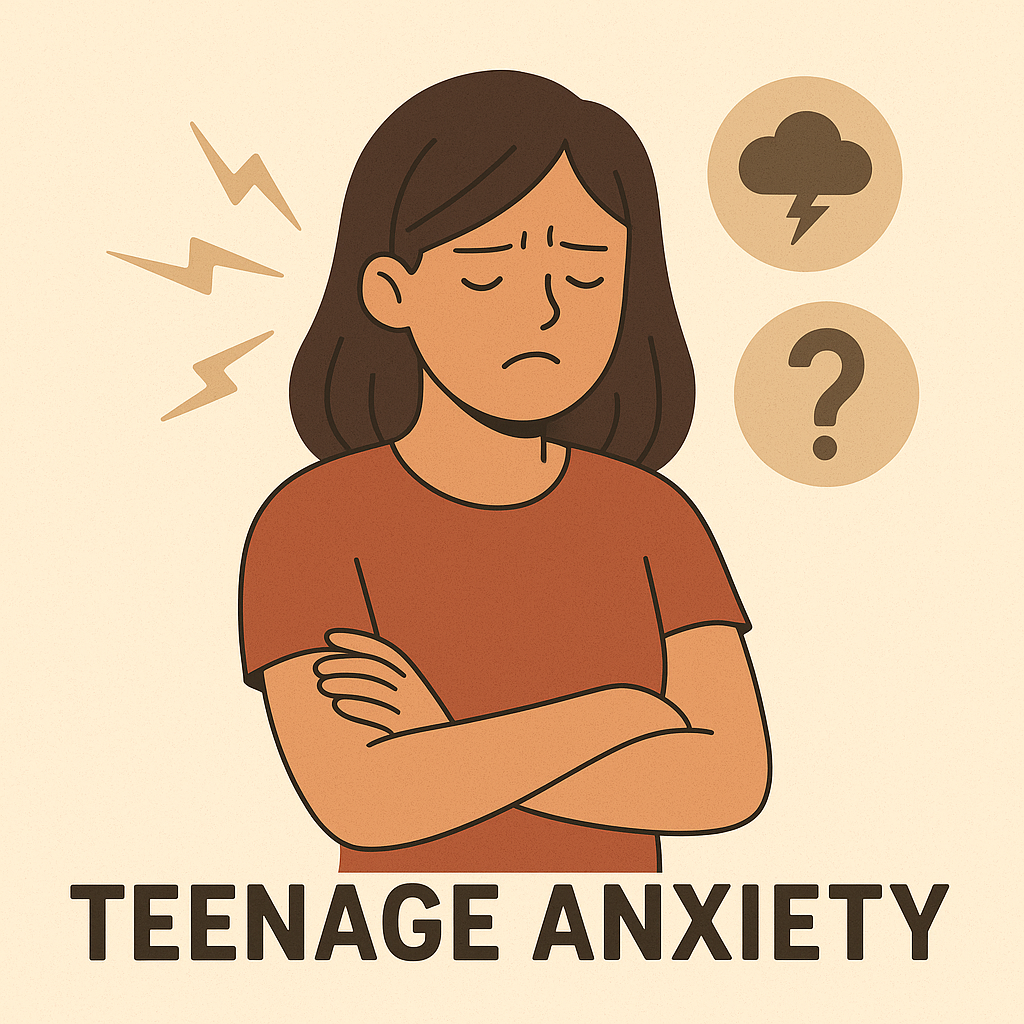Teenage Anxiety

All of us, at some point, have experienced moments of anxiety. Yet, we find a way to deal with our feelings of doom and gloom. But when this sense of doom, the worries and apprehensions, continue unabated, when palpitations, trembling, and physical restlessness becomes a constant state of our body, and when our anxious thoughts, fearsome feelings, and uncomfortable bodily sensations overwhelm us, that is when we know that this anxiety is something that we need to seek help for.
As parents, it is always distressing and difficult when a child is battling with a difficult situation. Anxiety is a faceless, nameless demon, and watching your teen battling this invisible, yet real, demon, can be heart-breaking. Let us look at some ways in which we can be there for our children as they grapple with anxiety.
Acknowledge Their Anxiety
Their worries are real to them. Brushing off their anxiety only makes them feel lonely and isolated. Instead, hear them out. Acknowledge that you get their apprehensions. Use simple paraphrasing and rephrasing methods to let them know that you understand what they are going through.
“I can see that you are really anxious about this.”
“You are worried that you won’t pass the exams.”
These are a few simple ways in which you can restate what they are feeling. No, you are not encouraging their fears; you are simply validating their experience. And that goes a long way in making them feel understood.
Express Empathy
Let them know that you empathise with their worries. Try to see the situation the way they see it and understand their fears. Communicating empathetic understanding opens them up to the possibility that they are not alone, but are supported by significant others (mainly you), in their lives.
Gently Move them in the Present
Anxieties usually stem from apprehensions about the future or ruminations about the past. Gently refocusing your teen to the here and now can help them keep their apprehensions in check. This needs to be done tactfully and gently. For instance, to a teen who is anxious about going blank in the exam, gently moving their attention to what they can do today to prevent that from happening, breaks the cycle of ruminative thoughts and also helps them focus on solutions rather than their own emotions.
Teach them to be Mindful toward the Physical Manifestations of their Anxiety
The butterflies in the stomach and the trembling of the body, the racing heart and the sweating palms …… these are the physical manifestations of the anxious thoughts. Encouraging them to simply become aware of their body’s response to anxiety helps ground them and feel calmer.
Share Your Experiences with Anxiety
One of the best ways to get teens to listen to you is to talk about your own experiences, situations where you may have experienced anxiety. It helps build perspective, helps your teen understand that at times mind can play games by creating scenarios that are highly unlikely to unfold in reality.
Radiate a Sense of Calm
One of the worst possible reactions you can give to your teen’s anxiety, is to become anxious yourself. On the other hand, if you stay calm in the face of their overwhelming emotion, it immediately provides them with a sense of support and solace
Learn the Language in which your Teen Expresses Anxiety
Often, anxiety comes in the form of restlessness, irritability, sullenness, and other behavioural manifestations; or shows up as headaches, stomach aches, nausea and vomiting, GE issues and other physiological expressions. As a parent, you know your child best, you know how your child usually tends to react to stressors. Once you notice their typical manifestation, reflect it to them.
“I notice you are feeling quite restless today. Is there something on your mind that you would like to talk about?”
“You have been feeling nauseous for several days. Are you feeling worried about something?”
These simple reflections will allow your teen to notice their own underlying anxiety, and also open the pathway for you both to have a conversation around it.
Normalise Occasional Anxiety
Helping your teenager see that occasional bouts of anxiety are normal, and experienced by everyone, helps them feel less alone, and allows them to cope with it better. Instead of pooh-poohing their worries, telling them that these worries are understandable allows for ease and spaciousness for the anxiety to eventually dissipate.
Help them Identify Pathological Anxiety
At the same time, it is also important that you as a parent, are able to understand that beyond a point, anxiety can be pathological, and can overwhelm your teenager. It is important to first educate yourself about clinical anxiety, gauge whether what your teenager is experiencing is normal or clinical anxiety, and accordingly seek help.
Offer them Professional Support
You may be surprised by how readily children agree to go into therapy; in fact, several may even come up to you and ask you to seek an appointment with a psychologist. In severe cases, you may also need to see a psychiatrist to consider the need for medication. Today’s youth is very aware of mental health challenges, and sees no problem in seeking professional help when they are unable to cope with their issues.
Ms. Samindara Sawant
Psychologist & Psychotherapist

Ms. Samindara Sawant
Samindara has been associated with corporates both as a psychologist as well as an assessor. She has expertise in assessment-development centers, conducting assessor training workshops, competency-based interviewing, and facilitation during development workshops. She is a Certified 16PF Professional and has extensive experience in using this psychometric test for corporate assessments.
Related Blogs
No related blogs available.

